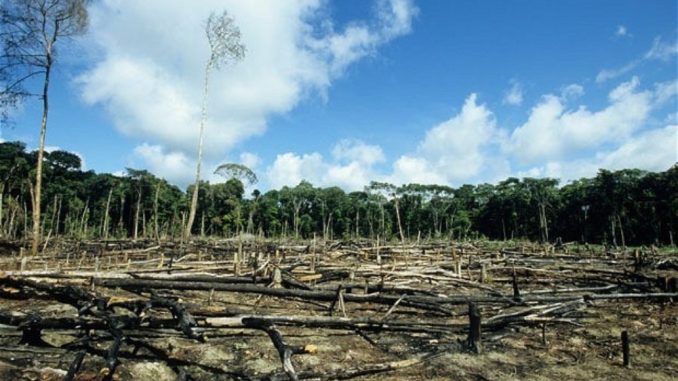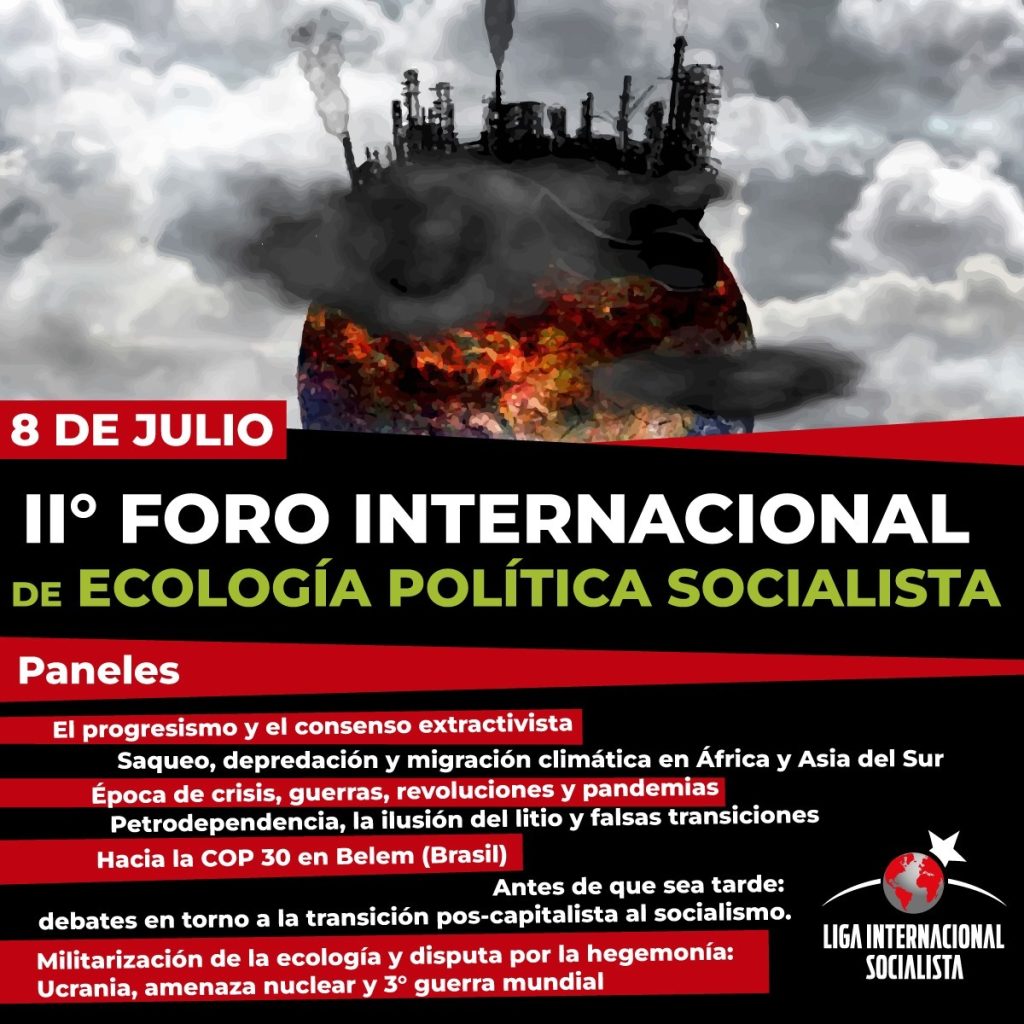
The II World Congress of the International Socialist League took place in Barcelona just 90 days ago. At that event, with representatives from almost 30 countries on all 5 continents, one of the main resolutions was to convene a new International Forum on Socialist Ecological Politics. On July 8, during a whole day, seven panels with speakers from all latitudes will present analysis and proposals for militant action to face what is possibly the greatest challenge of our time: overcoming the socio-environmental collapse that is taking place on the planet.
By Mariano Rosa
Socialists have to incorporate the socio-environmental agenda into our political action platform, as a priority. The ISL, since its foundation, collectively assumed this task. Because transforming the world, emancipating humanity socially, economically and politically from capital, means reversing, with transitional measures, the disastrous legacy that the current mode of production is accumulating. The red alerts are enormous, and it is key to be aware of the scale of the problem. The latest report from the Intergovernmental Group of Experts on Climate Change (which depends on the UN), has reaffirmed very serious data:
- A warming of 1.5 C° (Celsius degrees) would have consequences that are very difficult to counteract in social terms: the displacement of millions of people, droughts, unbearable heat and floods due to changes in the behavior of the rains.
- The objective of the Paris Summit (2016) of reducing global warming to less than that figure already seems difficult to achieve, almost utopian given the absence of mitigation measures and urgent radical change.
- The greatest threat of this type, without a doubt, is the feared retreat of gigantic glaciers in Antarctica: they alone could raise the sea level by around four meters.
The report uses the slogan “every ton of CO2 counts.” And indeed it does. Just to mention the impact of imperialist militarism, the US military industry sends into the atmosphere around 80 million tons of CO2 every year. Add 70 million tons emitted by the US Department of Defense, not counting the emissions of hundreds of military bases abroad. The way out of the socio-environmental crisis is political and anti-capitalist. That is the opinion of reality. And time is pressing.
Capital, an irreversible precipice
The system does not produce socially necessary things, but values, to maximize the profits of the owners. The latter wage a relentless competitive war among themselves to increase labor productivity. To achieve this, they resort to increasingly advanced machinery. Therefore, producing for the sake of producing (which means “consuming for the sake of consuming”) is not a contingent effect of capitalism, but rather a congenital trait. This mode of production requires accumulation and private hoarding. In his most famous book, “The Theory of Economic Development,” bourgeois economist Schumpeter summarized this bluntly: “Capitalism without accumulation is a contradiction in its own terms.” Marx stated that “the only limit of capital is capital itself.” With this formulation, he implied that capital, not as a “lot of money,” but as a social relationship -which implies that a quantity of money is transformed into more money thanks to the extraction of surplus value corresponding to unpaid work- derives in the “exploitation of its two main sources of wealth: labor force and nature.” So, as a first basic conclusion: within the framework of the current world-economy, there is no way out of the perspective of approaching catastrophe.
Stalinist productivism, a disaster
Marxism is attacked in the socio-environmental debate from both right and left (ideologically speaking). The indefensible balance sheet of the experience of 20th century “real socialism,” that is, the bureaucratic wreck of the USSR and Eastern Europe, is used to this end. It would take too long to explain here in detail some of the ecological atrocities commited by this distortion:
- The draining of the Aral Sea due to the bureaucratic construction of a 500 kilometer irrigation canal that caused a catastrophe in the region.
- The nuclear explosion at Chernobyl in 1980.
- East Germany and Czechoslovakia exceeding the per capita CO2 emissions of the core capitalist countries.
This balance sheet of “real socialism” is explained by Stalin’s bureaucratic counterrevolution. State productivism was the result of a system of bonuses given to the directors of nationalized companies to encourage them to exceed the objectives of the production plan and surpass the US in GDP. For economic reasons, these directors used and squandered the maximum amounts of materials and energy per unit produced. There was no concern for the consequences on the quality of what was produced, since consumers had no freedom of choice, no freedom of criticism, and no possibility of discussing the social and environmental effects of a production that was not subject to any social control. However, what is important to note in the struggle of ideas in favor of our proposal is that, while unsustainable productivism is intrinsic to capitalism, these disastrous derivations are a consequence, not of “socialism in general,” but of its Stalinist, bureaucratic and distorting negation. This thesis is crucial in the ideological struggle between post-capitalist perspectives.
Changing all the rules: our socialist model
Our program, as a response to the socio-environmental crisis, is neither green capitalism nor left-wing productivism: it is an ecosocialist transition program. It implies assuming the relationship of the mode of production/consumption with nature as a metabolism administered in a non-capitalist rational way. That is to say: the rationality of the 99%, of producing/consuming on the basis of a democratic planning of socially necessary things, not that of the 1% that consists of producing exchange values for private profit and hoarding. That point of reference reorients everything: the energy matrix, the manner of producing food, the use of public space. At the same time, it must be articulated with a global proposal that includes dismantling the entire superstructure of capital: patriarchy, for example, caste democracy, replacing it with a political system for the permanent mobilization/participation of the social majority: real workers’ democracy. It also includes the dismantling of the repressive apparatus that preserves minority property. That is to say: our global project integrates ecosocialism as a transitional and revolutionary response to the socio-environmental catastrophe, and, at the same time, deploys a wide range of measures to reorganize everything. Our identity and project are socialist and internationalist, anti-capitalist, anti-bureaucratic and, in ecological matters, ecosocialist. And of course, as in any uneven process of revolution, it will be necessary to assume the tensions and contradictions of the post-capitalist and anti-imperialist conversion in extremely backward semi-colonies such as our countries in Latin America, Africa or Asia. The needs of the revolutionary strategy and the dynamics of the class struggle will determine the rhythm for implementing our comprehensive program from an internationalist perspective. In turn, the tasks of the transition, the debates around how to carry it out, the role of the working class and the revolutionary party, are other polemic debates to address. The II International Forum of the ISL is proposed as an invitation to deliberate on these issues.

Schedule
II International Forum on Socialist Ecological Politics
Comprehend the collapse, organize the response
Panels
- Plunder, depredation and climate immigration in Africa and South Asia
- Militarization of the environment and the struggle for hegemony: War in Ukraine, nuclear threat and World War III
7 AM (Central America), 8 AM (Colombia), 9 AM (Chile -Venezuela), 10 AM (Argentina – Brazil -Paraguay), 3 PM (France – Spain), 4 PM (Turkey – Lebanon – Africa), 6 PM (Pakistan)
- An epoch of crisis, wars, revolutions and pandemics: productive matrix and health system
- Oil dependency, the lithium illusion and false transitions
- Latin American progressivism and the extractivist consensus
10 AM (Central America), 11 AM (Colombia), 12 PM (Chile, Venezuela), 1 PM (Argentina – Brazil – Paraguay), 6 PM (France – Spain), 7 PM (Turkey – Lebanon – Africa), 9 PM (Pakistan)
- Towards the COP 30 in Brazil: Summits and counter-summits
- Before it’s too late: debates on the post-capitalist transition to socialism
1 PM (Central America), 2 PM (Colombia), 3 PM (Chile – Venezuela), 4 PM (Argentina – Brazil – Paraguay), 9 PM (France – Spain), 10 PM (Turkey – Lebanon – Africa), 12 AM (Pakistan)








